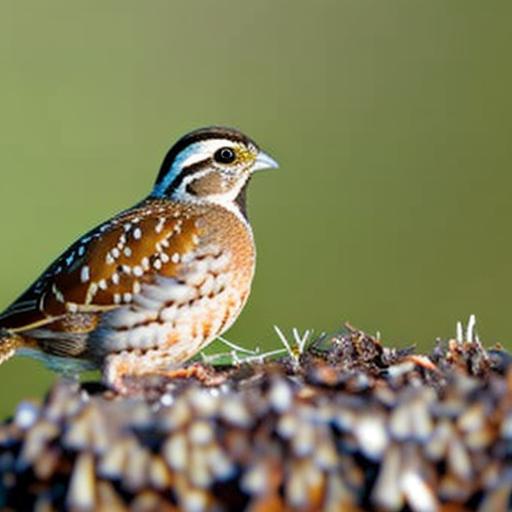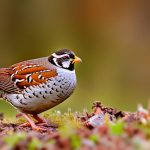Raising baby quail can be a rewarding and enjoyable experience for many people. Quail are small, ground-dwelling birds that are known for their fast growth and high egg production. They are also relatively easy to care for, making them a popular choice for backyard poultry enthusiasts. However, raising baby quail does come with its own set of challenges, particularly when it comes to keeping the chicks healthy and thriving. In this article, we will explore some common causes of death in baby quail, preventative measures for keeping them healthy, proper nutrition, housing and environmental considerations, as well as health and disease management. By understanding these key aspects of raising baby quail, you can ensure that your chicks have the best possible start in life.
Raising baby quail requires careful attention to detail and a good understanding of their specific needs. From the moment they hatch, quail chicks require a warm, clean environment, proper nutrition, and protection from predators. It’s important to be prepared for the unique challenges that come with raising these tiny birds, but with the right knowledge and resources, you can successfully raise healthy and happy quail. Whether you are a first-time quail owner or an experienced poultry enthusiast, this article will provide you with valuable information on how to raise baby quail and keep them thriving from day one.
Key Takeaways
- Raising baby quail requires careful attention to their specific needs and vulnerabilities
- Common causes of death in baby quail include temperature fluctuations, predators, and disease
- Preventative measures for keeping baby quail healthy include providing a safe and warm environment, regular monitoring, and proper nutrition
- Proper nutrition for baby quail includes a balanced diet of high-quality feed and access to clean water
- Housing and environmental considerations for baby quail include providing adequate space, proper bedding, and protection from predators
Common Causes of Death in Baby Quail
Unfortunately, baby quail are susceptible to a number of common causes of death, particularly in the first few weeks of life. One of the most common causes of death in baby quail is dehydration. Quail chicks are very small and can quickly become dehydrated if they do not have access to clean water at all times. Additionally, they can easily drown in water dishes that are too deep, so it’s important to provide them with shallow water containers that they can easily access. Another common cause of death in baby quail is temperature fluctuations. Quail chicks require a warm environment to thrive, and if they become too cold or too hot, it can quickly lead to illness and death. It’s important to provide them with a consistent temperature in their brooder, typically around 95-100 degrees Fahrenheit for the first week, and then gradually decreasing by 5 degrees each week until they are fully feathered.
Predators are also a significant threat to baby quail. Whether you are raising quail indoors or outdoors, it’s important to protect them from potential predators such as cats, dogs, raccoons, and birds of prey. Additionally, overcrowding can lead to stress and aggression among quail chicks, which can result in injury or death. It’s important to provide them with enough space to move around comfortably and establish a pecking order without causing harm to one another. By being aware of these common causes of death in baby quail, you can take proactive measures to prevent them and ensure the health and well-being of your chicks.
Preventative Measures for Keeping Baby Quail Healthy
There are several preventative measures that can be taken to keep baby quail healthy and thriving. One of the most important steps is to provide them with a clean and warm environment. This includes using clean bedding in their brooder, ensuring that their water is always fresh and free from contaminants, and maintaining a consistent temperature in their living space. It’s also important to protect them from potential predators by using secure enclosures and keeping a close eye on their surroundings.
Proper handling is also crucial for keeping baby quail healthy. It’s important to handle them gently and minimally in the first few weeks of life to reduce stress and the risk of injury. Additionally, providing them with proper nutrition is essential for their growth and development. This includes feeding them a high-quality starter feed that is specifically formulated for game birds, as well as providing them with access to grit for digestion. By taking these preventative measures, you can help ensure that your baby quail have the best possible start in life and are less susceptible to illness and injury.
Another important preventative measure for keeping baby quail healthy is to monitor their behavior and appearance closely. Any signs of illness or distress should be addressed immediately to prevent further complications. By being proactive and attentive to their needs, you can help prevent common health issues and keep your baby quail thriving.
Proper Nutrition for Baby Quail
Proper nutrition is essential for the health and growth of baby quail. When it comes to feeding baby quail, it’s important to provide them with a high-quality starter feed that is specifically formulated for game birds. This feed should contain the necessary nutrients, vitamins, and minerals that are essential for their growth and development. Additionally, providing them with access to grit is important for aiding in digestion.
In addition to starter feed, it’s important to provide baby quail with access to fresh water at all times. Water is essential for their overall health and well-being, and dehydration can quickly lead to illness and death in young chicks. It’s important to provide them with shallow water containers that they can easily access without the risk of drowning.
As baby quail grow, their nutritional needs will change. It’s important to transition them to a grower feed at around 6-8 weeks of age, which will provide them with the additional nutrients they need as they continue to develop. By providing baby quail with proper nutrition from day one, you can help ensure that they have the best possible start in life and are less susceptible to common health issues.
Housing and Environmental Considerations for Baby Quail
Providing appropriate housing and environmental considerations is crucial for the health and well-being of baby quail. When it comes to housing baby quail, it’s important to provide them with a clean and secure brooder that is free from drafts and potential predators. The brooder should be lined with clean bedding such as pine shavings or paper towels, which should be changed regularly to maintain a clean living environment.
Maintaining a consistent temperature in the brooder is also essential for the health of baby quail. For the first week of life, the brooder temperature should be around 95-100 degrees Fahrenheit, gradually decreasing by 5 degrees each week until they are fully feathered. It’s important to monitor the temperature closely and make adjustments as needed to ensure that the chicks are comfortable and thriving.
In addition to proper housing and temperature control, it’s important to provide baby quail with enough space to move around comfortably. Overcrowding can lead to stress and aggression among chicks, which can result in injury or death. Providing them with enough space will allow them to establish a pecking order without causing harm to one another.
Health and Disease Management for Baby Quail

Health and disease management is an important aspect of raising baby quail. It’s important to monitor the behavior and appearance of your chicks closely for any signs of illness or distress. Common signs of illness in baby quail include lethargy, loss of appetite, diarrhea, difficulty breathing, or abnormal posture.
If you notice any signs of illness in your baby quail, it’s important to address the issue immediately. This may involve isolating the sick chick from the rest of the group to prevent the spread of illness, as well as seeking veterinary care if necessary. Additionally, practicing good hygiene and sanitation in their living environment can help prevent the spread of disease among your quail flock.
Another important aspect of health management for baby quail is vaccination. Depending on your location and local regulations, there may be vaccines available to protect your quail from common diseases such as Marek’s disease or coccidiosis. It’s important to consult with a poultry veterinarian or local agricultural extension office to determine if vaccination is necessary for your quail flock.
By being proactive about health management and disease prevention, you can help ensure that your baby quail remain healthy and thriving as they grow.
Conclusion and Resources for Further Information
Raising baby quail requires careful attention to detail and a good understanding of their specific needs. By being aware of common causes of death in baby quail, taking preventative measures for keeping them healthy, providing proper nutrition, ensuring appropriate housing and environmental considerations, as well as practicing good health management and disease prevention, you can help ensure that your chicks have the best possible start in life.
For further information on raising baby quail, there are many resources available including books, online forums, local agricultural extension offices, and poultry veterinarians who can provide valuable guidance and support. Additionally, joining a community of fellow quail enthusiasts can provide you with a network of support and knowledge sharing as you embark on this rewarding journey of raising baby quail.
In conclusion, raising baby quail can be a fulfilling experience when approached with care and knowledge. By understanding their specific needs and taking proactive measures to ensure their health and well-being, you can raise healthy and happy quail that will bring joy to your life for years to come.
If you’re struggling with baby quail mortality, you’re not alone. Many backyard poultry enthusiasts face this challenge. However, there are resources available to help you navigate this issue. For instance, Poultry Wizard offers valuable insights on various poultry-related topics. You might find their article on chicken coop trampolines particularly interesting, as it provides innovative ideas for enhancing your coop’s design and functionality. Additionally, their article on geese egg production and chicken coop door sizes could offer valuable insights into optimizing your poultry setup for better results. Check out these resources to gain a deeper understanding of poultry care and management.
FAQs
Why are my baby quail dying?
There are several reasons why baby quail may be dying, including inadequate nutrition, temperature fluctuations, disease, and stress. It’s important to ensure that the quail have access to proper food, water, and a suitable environment to thrive.
What should I feed baby quail?
Baby quail should be fed a high-protein game bird starter feed, typically with a protein content of around 24-28%. It’s important to provide them with a balanced diet to support their growth and development.
How do I keep baby quail warm?
Baby quail need to be kept in a warm environment, ideally with a brooder temperature of around 95-100°F for the first week, decreasing by 5°F each week until they are fully feathered. A heat lamp or heat plate can be used to provide the necessary warmth.
What are common diseases that affect baby quail?
Common diseases that can affect baby quail include coccidiosis, Marek’s disease, and infectious bronchitis. It’s important to monitor the health of the quail and seek veterinary care if any signs of illness are observed.
How can I reduce stress for baby quail?
To reduce stress for baby quail, it’s important to provide them with a clean and spacious environment, minimize handling, and ensure that they have access to food and water at all times. Additionally, maintaining a consistent temperature and avoiding sudden changes in their environment can help reduce stress.
Meet Walter, the feathered-friend fanatic of Florida! Nestled in the sunshine state, Walter struts through life with his feathered companions, clucking his way to happiness. With a coop that’s fancier than a five-star hotel, he’s the Don Juan of the chicken world. When he’s not teaching his hens to do the cha-cha, you’ll find him in a heated debate with his prized rooster, Sir Clucks-a-Lot. Walter’s poultry passion is no yolk; he’s the sunny-side-up guy you never knew you needed in your flock of friends!







